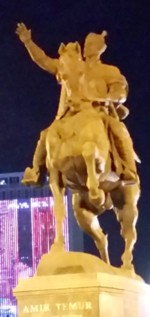Uzbekistan
Our first stop would be Tashkent 100 km from the border. So we had a couple of hours to see firsthand the irrigated fields that have bled the once great Aral Sea dry. Water, water everywhere here. It’s mostly cotton but there’s plenty of wheat and even rice. Trees along the road were laden with fruit. Indeed what was once semi-desert is now a land of milk and honey.
But it’s not all wonderful. The raised water table had brought salt from below, in land that was once under the salty ocean. Downriver, salty and chemical laden runoff has polluted the now almost dry but once vast Aral Sea, where once trading steamboats cruised from side to side and fishermen made their livelihood. Now large ships are famously stranded on dry land tens of kilometres from the remaining water and toxic dust storms sweep the area.
Yet seeing these irrigated fields, now approaching 5 million hectares (18,000 square miles) in Uzbekistan alone, and the ongoing economic growth they have produced, might it be a fair trade: a few fisher-folk and sailors sacrificed to become the world's largest producer of cotton and to have added an extra 30 million people since 1950? Or is this a prime example of misjudged agricultural development leading to the uncontrolled human population growth that's destroying our one and only planet?
Water, Water Everywhere
The Aral Sea is actually a terminal lake with no outfall. It exists due to water flowing down from the catchments in high glaciated mountains of Tajikistan, Kyrgyzstan and Afghanistan, to the south-east. From there a number of tributaries feed either the Amu Darya, known to the Greeks as the Oxus or the Syr Darya, known by the Greeks as the Jaxartes (Pearl River) that runs almost parallel to the Amu Darya 500 km to the north-east.
The region between the Amu Darya and the Syr Darya has been known as Transoxiana since the time of Alexander the Great. Yet the existence of the Aral Sea itself was unknown to Europeans until the 17th century, probably due to the desert that surrounds it and ferocious reputation of the local tribes. Early Russian explorations discovered that it was already shrinking even then.
Our first acquaintance with the Syr Darya had been in Khujand and we would meet a major tributary, the Chirchiq, in Tashkent.
After crossing the border into Uzbekistan almost the first thing you notice is that many signs are in Latin script rather than in Cyrillic (Russian) or Arabic (the original for a millennia). The Latinization of Uzbek script goes back to 1924 when an effort was made to unify all Turkic languages but it was changed to Cyrillic in 1940 under Stalin. In 1992, after independence, the previous policy was reinstated and Latin script is now used in schools and official communications, although the two other scripts are still in wide use.
Being able to read some signs, like metro stations, certainly makes life easier for Western tourists, even when the language itself remains a mystery. But, as in Russia, it helps to know the Latin equivalence of the few characters that differ in Cyrillic, as some signs and labels still have no Latin script.
As I said at the outset, my expectations of these countries had been shaped by India and what I'd seen of Afghanistan on TV. I'd imagined that the legendary cities of Tashkent, Bukhara and Samarkand would be similar to Jodhpur and Jaisalmer perhaps consisting of a large fortress surrounded by narrow streets; hemmed in by many cramped mud-brick buildings; the side streets populated by playing children and dogs near the open door to their house; but there'd be no cows; instead turbaned and bearded men would gather regularly as the call to prayer echoed from the central mosque; and the markets or the souk would bustle with veiled women, buying ingredients for a family meal and lollies (candy) from the vendors' stalls; the air redolent with the smells of spices and fresh vegetables and raw meat and food cooking.
I was already beginning to realise that in these countries that ancient world had largely passed with the 20th century but nothing had prepared me for Tashkent.

